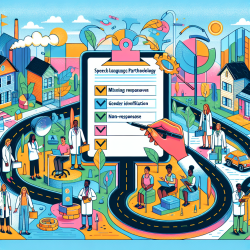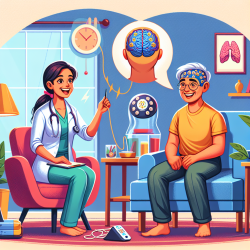Introduction
In the realm of speech-language pathology, understanding the underlying factors that influence behavior and performance is crucial. The study titled "Dissecting Driver Behaviors Under Cognitive, Emotional, Sensorimotor, and Mixed Stressors" provides a comprehensive look at how different stressors impact performance, which can be extrapolated to enhance practitioner skills in various fields, including online therapy services for children.
Research Insights
The study involved a simulation experiment with 59 drivers to assess the effects of cognitive, emotional, sensorimotor, and mixed stressors on driver performance. Key findings include:
- All stressors significantly increased sympathetic arousal, indicating heightened stress levels.
- Sensorimotor and mixed stressors led to more dangerous driving, characterized by larger lane departures.
- Cognitive and emotional stressors, paradoxically, resulted in safer driving, suggesting an effective coping mechanism at play.
These findings suggest that cognitive and emotional stressors may activate compensatory mechanisms that mitigate their impact on performance, a concept that can be applied to therapeutic practices.
Application to Practice
For practitioners in speech-language pathology, especially those providing online therapy, these insights can be instrumental. Here’s how:
- Understanding Stress Responses: Recognizing how different stressors affect children can help tailor therapy sessions to minimize negative impacts and enhance coping strategies.
- Data-Driven Interventions: Utilizing data to identify stressors in children can guide the development of personalized intervention plans that consider cognitive and emotional states.
- Enhancing Coping Mechanisms: By fostering environments that promote effective coping strategies, practitioners can improve therapy outcomes for children.
Encouraging Further Research
The study opens avenues for further research into how these stressors affect different populations, including children. Practitioners are encouraged to explore these areas:
- Investigate how cognitive and emotional stressors specifically impact children's learning and therapy outcomes.
- Develop methods to measure and assess stress responses in children during therapy sessions.
- Explore the role of technology in mitigating stressors and enhancing therapy effectiveness.
Conclusion
Understanding the nuanced effects of different stressors on performance can significantly enhance practitioner skills and therapy outcomes. By leveraging data-driven insights and fostering effective coping mechanisms, speech-language pathologists can create more impactful therapy sessions for children.
To read the original research paper, please follow this link: Dissecting Driver Behaviors Under Cognitive, Emotional, Sensorimotor, and Mixed Stressors.










